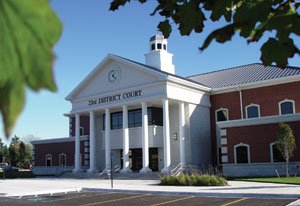Michigan Law and Mental Health in Jail and Prison
Jails and prisons are filled with people who need mental health treatment, not punishment.

Treatment and Assistance for Defendants Charged with Felony or Misdemeanor Offenses
In March 2014, a new law was signed that requires county law enforcement and community mental health service programs to work with courts and other organizations on taking steps to provide treatment and assistance to people with mental illness. The specific focus would be on people considered at risk of entering the criminal justice system, those not receiving needed mental health treatment in county jail, and those not receiving services upon release or discharge from a county jail. There will also be a focus on people at risk of being committed to the Michigan Department of Corrections.
Lt. Governor Brian Calley, who chairs the Mental Health Diversion counsel, stated, “Through treatment, we can help those with mental illness overcome underlying problems, which may reduce recidivism and help them to lead better lives. It’s a comprehensive form of smart justice that will make Michigan healthier and safer.”
Mentally ill offenders in the criminal justice system
According to some estimates, as much as 50% of the United States prison population suffers from some form of mental illness. Consequently, thousands of mentally ill offenders are sent to prisons that are poorly equipped to treat them. Nationwide changes are being made. In New York City, judges are instructed to consider a person’s mental health status and consider treatment. This was after it was determined that the mentally ill had cost New York City three times as much as other inmates. Pennsylvania’s state prisons are introducing incentives for its mental health services contractors to reduce the number of infractions by mentally ill offenders. Colorado now prohibits prisons from placing inmates with major mental illnesses in solitary confinement. Michigan is expanding the state’s mental health court program.
The Intersection of Mental Health and Justice: Navigating the Path Towards Treatment and Away from Jail
In the vast and complex ecosystem of the criminal justice system, a critical and often overlooked aspect is the profound impact of mental health on individuals’ encounters with the law. At LEWIS & DICKSTEIN, P.L.L.C., we stand at the forefront of addressing one of the most pressing issues facing our society today: the unjust incarceration of individuals with mental health conditions due to the lack of adequate mental health treatment options. This concern highlights a significant failure in our healthcare and justice systems and underscores the urgent need for comprehensive reform.
The Reality of the Crisis
Mental health conditions affect millions of Americans, yet the resources and support systems in place remain woefully inadequate. The shortfall in mental health care services has led to a situation where jails and prisons have become de facto mental health facilities, housing an alarmingly high number of individuals who would be better served by treatment rather than incarceration. This systemic failure perpetuates a cycle of punishment over rehabilitation, disproportionately impacting those who are most vulnerable.
The Consequences of Inadequate Care
The consequences of the criminal justice system’s reliance on incarceration over treatment are profound and far-reaching. Individuals with untreated mental health conditions are more likely to experience encounters with law enforcement, leading to a higher likelihood of arrest and subsequent jail or prison sentences. Once incarcerated, the lack of adequate mental health care within correctional facilities exacerbates these conditions, leading to worsened outcomes upon release. This cycle of arrest, incarceration, and release without proper treatment serves neither the individual nor society.
The Need for a Paradigm Shift
At LEWIS & DICKSTEIN, P.L.L.C., we advocate for a paradigm shift in how the justice system approaches individuals with mental health conditions. Our commitment to justice demands that we recognize the critical need for:
- Enhanced Mental Health Services: Expanding access to mental health care within communities and the criminal justice system to provide timely and effective treatment options.
- Diversion Programs: Implementing and expanding diversion programs that offer alternatives to incarceration, such as mental health courts, which focus on treatment and rehabilitation rather than punishment.
- Training for Law Enforcement: Providing comprehensive training for law enforcement on dealing with mental health crises, aiming to de-escalate situations and direct individuals towards treatment instead of jail.
- Legislative Reform: Advocating for legislative changes that address the root causes of the intersection between mental health and criminal justice, ensuring that policies reflect a commitment to treatment over incarceration.

Michigan criminal defense attorneys – compassionate and experienced.
It is scary to be facing criminal charges; it is even more frightening when you also have a mental illness. Do not let anxiety or depression interfere with the protection of your rights in a criminal matter. The attorneys at LEWIS & DICKSTEIN, P.L.L.C. have decades of experience handling criminal matters. They are also compassionate in dealing with people who have mental illnesses. If you are accused of a felony or misdemeanor or charged with a crime and suffer from mental illness, you need a good and affordable attorney on your side. We are ready, willing, and able to protect you. If it is in our client’s best interest, we will do whatever is necessary to ensure they receive mental health treatment in jail.
Call us today at (248) 263-6800 for a free consultation or complete an online Request for Assistance Form. We will contact you promptly and find a way to help you.













